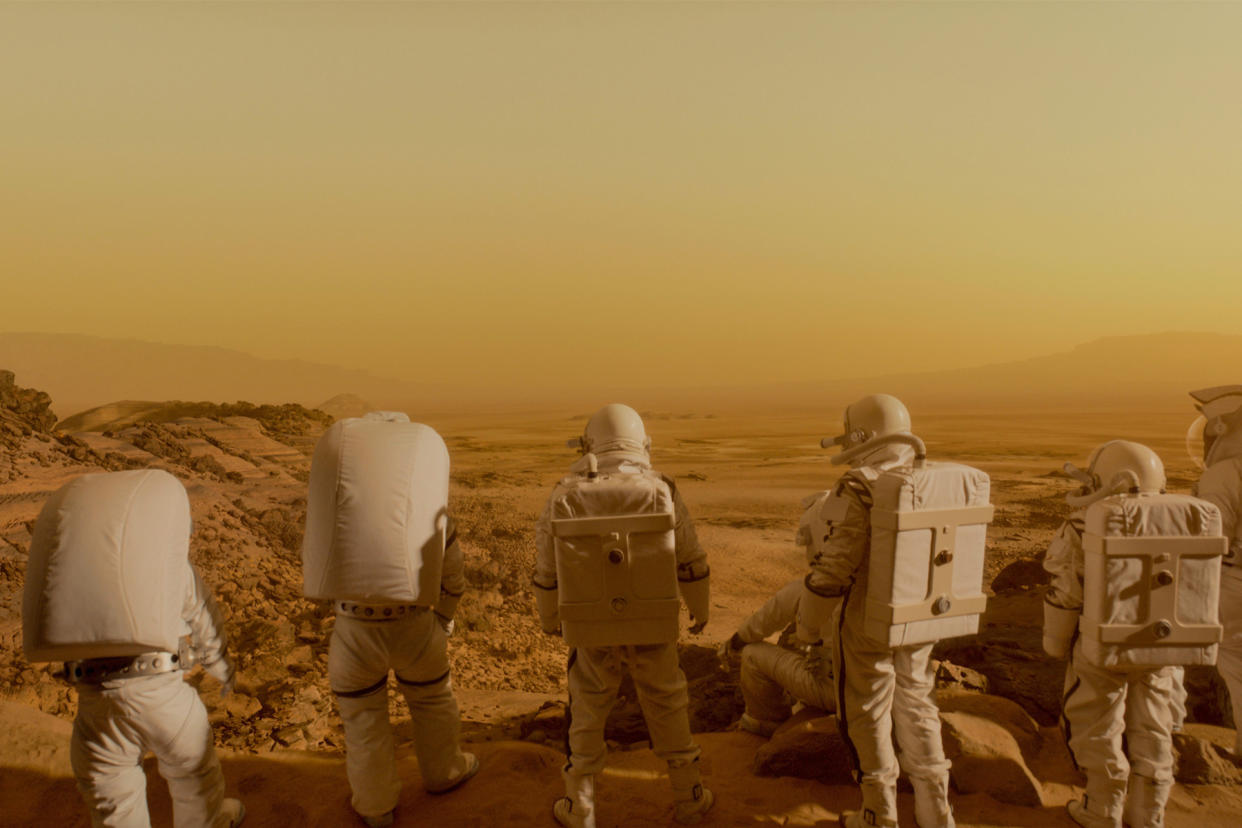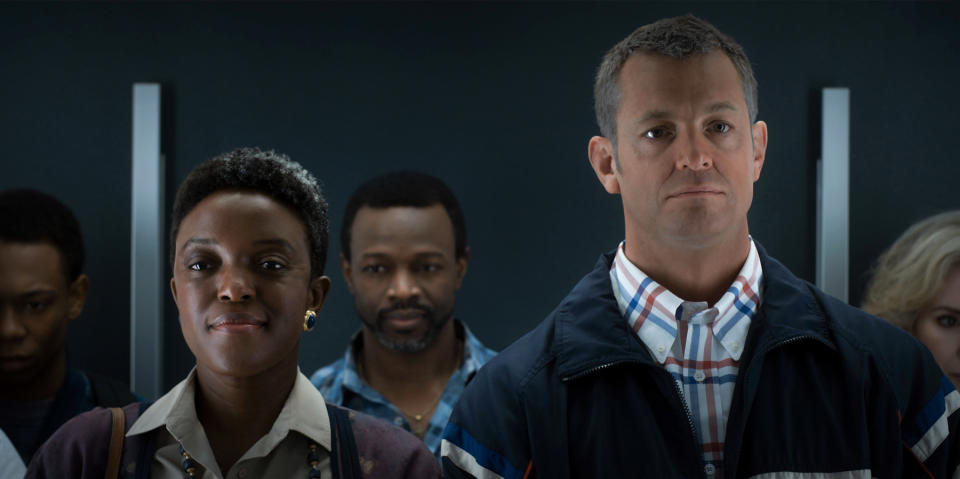‘For All Mankind’ Season 3: Apple’s Stellar Space-Race Show Keeps Heading Into the Stratosphere

The marvelous Apple TV+ drama For All Mankind takes place in an alternate timeline where the Soviets put the first man on the moon, triggering a never-ending space race and a cascade of other changes from the history we know. The first two seasons dealt with US vs. USSR tensions, and then outright fighting on the lunar surface. The new season jumps ahead to the early Nineties and a new frontier, as three separate groups compete to see who will be the first to reach Mars: NASA, their Russian counterparts, and a tech company called Helios, whose enigmatic founder, Dev Ayesa (Edi Gathegi), has long been fascinated with space. In the course of trying to beat their rivals to the red planet, each group finds itself cutting corners and putting lives and resources at risk.
FAM has no such competition. It’s not just that its second season was the best TV show of last year. It’s that no other drama on television is working in the same creative, for lack of a better term, space. It is science fiction, but also a workplace drama, and a fascinating look at many roads not taken in the history of the final third of the 20th century, and a spy thriller, and an action show. And, most of all, it is a great, big populist crowd-pleaser, which makes it all the more baffling that it has not gotten the viral attention or awards love of so many of Apple’s other excellent series(*).
More from Rolling Stone
(*) Two interwoven theories on this: 1) The cast is lower-profile than shows featuring Reese Witherspoon, Jason Sudeikis, or Adam Scott. 2) The first couple of episodes of the series are not that exciting, and the second in particular is among the worst and most misconceived sophomore episodes ever of an otherwise great series. It’s not hard to imagine a lot of people who started the show then gave up quickly, because they didn’t care nearly as much as the showrunners did about tangential subjects like Wernher Von Braun’s Nazi Party affiliation or the specific reasons why Apollo 10 came close to the lunar surface without actually landing.
Yet despite having this storytelling niche more or less to itself, FAM in its third season begins to display some of the strain that’s apparent in each of the three potential Mars missions it’s chronicling. It’s still an enormously entertaining series, but the seams are showing a bit more in these new installments than they have in the past.
To be fair, critics were only given eight of this season’s episodes rather than the full season. And FAM is a show whose strength is most evident at the end of each season, when all the subplots that once seemed like filler instead turn out to be vitally important. (As the spectacular Season Two finale reminded us, Gordo started jogging again!) For All Mankind is definitely not The Wire, but it demonstrates a similar belief that all the narrative pieces matter, and pays off nearly everything at the conclusion of each season. So I feel as if I should serve up the following with many grains of salt, especially since the apparent reason we didn’t get all 10 in advance is because the digital effects work is being completed on what is, in every way, a more ambitious season than the first two. And the completed work we do see is fantastic, simultaneously selling the utter beauty and terrifying danger of space travel, like an image in the season premiere of an astronaut watching the sun peek out from behind the Earth as he hangs onto a space station at the end of a disturbingly thin tether. So the hope is that the season’s concluding episodes will not only look great, but will retroactively tie together some of the more disparate plot threads.
Where the CGI is beautiful and convincing, the makeup team has a harder job. Most of the season takes place more than a decade after the previous one ended, and over 25 years after the moment when we first met many of these characters. Early on, effort is made to age up some of them. NASA administrator Margo Madison (Wrenn Schmidt) is now worried about the size of her midsection and has a drawer filled with diet shakes in her desk at the Johnson Space Center. As NASA’s longest-serving astronaut Ed Baldwin, Joel Kinnaman gets some grey added to his hair and begins the season walking with a limp, though the latter is revealed to be the result of a minor injury. As Karen Baldwin, who was already married to Ed way back when he flew in the Korean War — which would put both of them somewhere in their 60s, and maybe put Ed into his early 70s — Shantel VanSanten is given a silver wig. Other actors get thinning hair and/or a bit of padding at the waist or in the cheeks, to varying degrees of success. But within a few episodes, the show is only vaguely trying to maintain the illusion of age. At one point, Ed tells a story from his Korea service while Kinnaman looks more or less like he just stepped off the set of The Suicide Squad. And there’s never much of an attempt to make Jodi Balfour look older as Ellen Waverly Wilson, the closeted ex-astronaut who, when the new season begins, has built a thriving career in the U.S. Senate with the help of her similarly closeted husband Larry (Nate Corddry).

AppleTV+
In and of itself, this is a relatively minor issue, especially late in a spring when TV has been awash in actors who look hilariously unconvincing buried under latex to play their characters’ older selves. But it’s emblematic of a larger one: As FAM keeps expanding the physical size of its universe by heading for Mars, it is still keeping the circle of its characters fairly tight, and not always gracefully.
It’s not just that old man Ed is still in contention to command the first Mars mission at an age when he’d at best be a glorified NASA mascot. (In our world, John Glenn returned to orbit as a famous space shuttle passenger when he was of similar vintage.) It’s that he is competing for the job with longtime colleague Danielle Poole (Krys Marshall), that both Ed’s daughter Kelly (Cynthy Wu) and fellow astronaut legacy Danny Stevens (Casey W. Johnson) are also candidates to be on one or more of the missions, and that Karen’s latest business venture leads to her playing a pivotal role in the race to Mars. Most of these are excellent characters worth continuing to follow, often with compelling conflicts that intersect well — like Ed’s desire to be first to Mars when he couldn’t with the moon versus Dani Poole still feeling the need to prove herself as a Black woman even though she very publicly averted nuclear Armageddon last season. But the sheer number of them still being centrally involved makes the world of space travel feel weirdly insular. Even as some characters like Danny’s parents Gordo and Tracy have died heroically(*), and others like Ellen have moved on to new arenas, the show practically treats astronaut as an aristocratic title that you hold onto for as long as you’re upright, and then pass along to your eldest.
(*) In the FAM-verse, there is of course a beloved movie inspired by Gordo and Tracy’s duct tape-wrapped sacrifice on the lunar surface, played by exactly the actors you imagine would have been hired to star in it at the time.
Or maybe it’s just that the all in the family approach is responsible for the only bad part of Season Two to blossom into an even worse part of Season Three.
While nearly every other subplot last season proved incredibly worth it in the end, there was the weirdly tone-deaf story in which Karen, feeling distant from Ed and still on some level grieving the death of their son Shane a decade earlier, had a fling with Danny — a.k.a. her son’s best friend until the day Shane died. There is a way to make this work, but it would require acknowledging the deeply dysfunctional psychology involved on both ends of this affair: Karen sleeping with a stand-in for the son she lost, and Danny sleeping with his dead friend’s mother, who’s also the maternal figure he always wished he had instead of the frequently absent Tracy. But the show seemed uninterested in grappling with this messiness, and instead treated it just as age-inappropriate adultery. (And even that didn’t work, because the two actors look too close in age, even with makeup.)
Look, few shows bat 1.000 creatively, even at their peak. But rather than admit defeat in this area and move on, FAM doubles down. Danny is a much more prominent part of this season, as are his feelings for Karen, which have only grown and become toxic in the years since they first hooked up. To some degree, this feels emotionally true to just how badly a person would be hurt by falling into such an unhealthy relationship. And there is at least some implicit acknowledgment this time around about the screwed-up Oedipal nature of it all. But the end result is that Danny becomes a cartoon villain, his Karen obsession so blatantly distracting him from his work that every character who fails to notice looks like an idiot. It eventually leads to a very good collection of scenes where Danny and Ed revisit some of their tragic shared history, but the season spends a lot of time on — and develops several major plot turns from — Danny being ridiculously awful in plain sight of everyone else. It’s not ideal.

Patrick McElhenney
There’s also a subplot back on terra firma where Danny’s younger brother Jimmy (David Chandler) gets mixed up with a group of conspiracy theorists who believe everything about Gordo and Tracy’s death is NASA propaganda. It feels a bit underfed, disappearing for so many episodes at mid-season that it was surprising when it appeared again, but it also feels true to the show’s mirror mirror ethos that this world would have its own version of 9/11 truthers. More effective is the political corner of the show, where Ellen and Larry deal with FAM-verse versions of Don’t Ask, Don’t Tell and the Monica Lewinsky scandal, both of them raising valid questions about what exactly either of them has gained by hiding their sexuality for so long. (Those stories are what FAM does so well: mixing big-picture historical concerns with patiently told character arcs.) And Edi Gathegi brings an intriguing air of mystery to Dev, even if the show tends to waver between treating him as an amoral tech mogul or just a man who’s hard to read because he thinks differently from the people around him.
But my goodness, does so much of the space material still cook. There are tremendous action set pieces in zero gravity and on the Martian surface. There are emotional moments of triumph and tragedy out there in the cold vacuum, and even some welcome comedy. (The cosmonauts are confused by Ed and Dani’s “Hi Bob!” greeting, dating back to a Season One moon mission where their only source of entertainment was a Bob Newhart Show videotape.) The new season also generates a lot of suspense out of the precarious position with the KGB that Margo wound up in at the end of last season, and with the tension this creates between her and longtime protege Aleida Rosales (Coral Peña).
Midway through the season, Karen finds herself unsure what she wants to do after a career setback, and prepares to get high with her old friend Wayne Cobb (Lenny Jacobson), husband to former astronaut Molly (Sonya Walger). Wayne recalls an old Ken Kesey line about how everyone is the star of their own movie, and tries to get Karen to decide what kind of movie she’d like to star in. At its best — which it still so often is — For All Mankind is able to present so many different, exciting movies at the same time that the missteps stick out more than they would on a series not trying to do as much, let alone as widely capable. By heading to Mars, FAM is reaching further than ever — a reach that sometimes exceeds its grasp, even as it’s a lot of fun to see them try.
The third season of For All Mankind begins streaming June 10 on Apple TV+, with additional episodes releasing weekly. I’ve seen the first eight of 10.
Best of Rolling Stone

